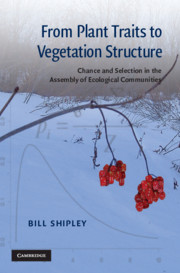 From Plant Traits to Vegetation Structure
From Plant Traits to Vegetation Structure Book contents
- Frontmatter
- Contents
- Preface
- 1 Playing with loaded dice
- 2 Population-based models of community assembly
- 3 Trait-based community ecology
- 4 Modeling trait-based environmental filters: Bayesian statistics, information theory and the Maximum Entropy Formalism
- 5 Community dynamics, natural selection and the origin of community-aggregated traits
- 6 Community assembly during a Mediterranean succession
- 7 The statistical mechanics of species abundance distributions
- 8 Epilogue: traits are not enough
- References
- Index
- References
1 - Playing with loaded dice
Published online by Cambridge University Press: 05 June 2012
- Frontmatter
- Contents
- Preface
- 1 Playing with loaded dice
- 2 Population-based models of community assembly
- 3 Trait-based community ecology
- 4 Modeling trait-based environmental filters: Bayesian statistics, information theory and the Maximum Entropy Formalism
- 5 Community dynamics, natural selection and the origin of community-aggregated traits
- 6 Community assembly during a Mediterranean succession
- 7 The statistical mechanics of species abundance distributions
- 8 Epilogue: traits are not enough
- References
- Index
- References
Summary
Analogies are a vital part of science because they help us to imagine the unknown with reference to that which we already understand. Although vital, analogies become dangerous when they become so entrenched that we confuse the analogy with reality. The danger, when this happens, arises because we are prevented from conceiving of nature in any other way. In medieval discourse the organizing Aristotelian analogy was nature-as-an-organism. Natural phenomena were seen to possess a life cycle: birth, growth, old age and death. Processes in the natural world were made intelligible in this way and were understood by comparison with the inherent desire (the “nature”) of sentient organisms to attain goals (teleology). Cats hunt mice. Why? Because a cat is a predator and it is in the nature of predators to hunt. A stone falls to the ground rather than flying up into the air. Why? Because it is in the nature of heavy objects (i.e. objects made of “earth” rather than “air”) to move down. To know the nature of a thing was to know the thing itself (Dear 2007).
This analogy was replaced in the seventeen century, by people like Descartes, Galileo and Newton, with a new one: the analogy of nature-as-a-machine. The hand of a mechanical clock doesn't move around the face because it is in its “nature” to do so – place the hand alone on a table and it remains stationary.
Information
- Type
- Chapter
- Information
- From Plant Traits to Vegetation StructureChance and Selection in the Assembly of Ecological Communities, pp. 1 - 9Publisher: Cambridge University PressPrint publication year: 2009